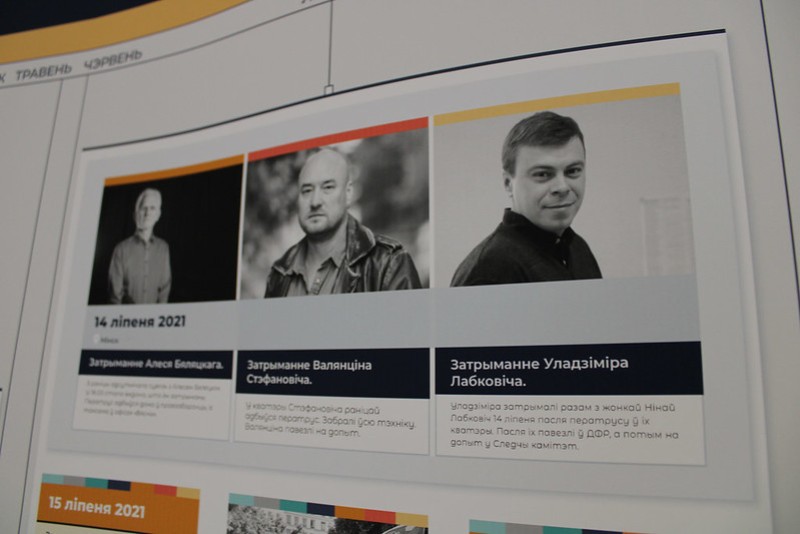Along with Bialiatski, who is the founder and chairman of Viasna, the Leninsky District Court in Minsk also sentenced Viasna’s co-chairman and vice-president of the International Federation for Human Rights (FIDH) Valiantsin Stefanovic to nine years prison and lawyer and human rights activist Uladzimir Labkovich to seven years, while Zmitser Salauyou was sentenced in absentia to eight years in prison.
The Court ruled that the human rights activists’ culpability of “smuggling by an organized group,” and “financing of group actions grossly violating the public order,” was thoroughly proven, according to Viasna.
Bialiatski was also fined 185,000 Belarusian rubles (US$73,400), while Stefanovic, Labkovich, and Salauyou were fined 111,000 Belarusian rubles ($44,000) each.
The court further ordered to recover from the defendants more than 752,438 rubles ($298,500), which they had allegedly “obtained by criminal means” through “smuggling by an organized criminal group.”
The International Federation for Human Rights (FIDH) warned that the defendants “had already endured more than 17 months of incarceration before their trial… which was replete with violations of human rights law.”
“The defendants were handcuffed and placed in a cage inside the courtroom, in violation of the presumption of innocence, denied the right to an interpreter and were not given sufficient time to familiarize themselves with the hundreds of volumes of case materials, all part of a rigged prosecution,” FIDH said.
It emphasized that Viasna became a target for its involvement in recording human rights breaches and for aiding victims of repression, after the “repression in Belarus has become pervasive and particularly brutal since the 2020 sham presidential elections, fully erasing the human rights movement and any dissent in the country.”
The group stressed that this unfair penalty is in reprisal for Viasna’s 25 years of human rights work in Belarus.
In a joint letter with 20 other human rights organizations worldwide, the FIDH therefore demanded the immediate release of Bialiatski, Stefanovic and Labkovich, all charges against them to be dropped.
“The signatory organizations strongly condemn once again the criminal prosecution of Ales Bialiatski, Valiantsin Stefanovic and Uladzimir Labkovich and reiterate their call to the Belarusian authorities to release them immediately and unconditionally, to drop all charges against them, and to end the judicial harassment against all human rights defenders in the country,” the human rights organizations said in the appeal.
The document cited an acting member of the Viasna board, Pavel Sapelka, as saying that “the position of the Prosecutor’s Office in the case of our friends and colleagues is the epitome of lawlessness by the Belarusian authorities.”
“Draconian prison terms and fines, even by the abysmal standards of the profoundly compromised Belarusian judiciary, is an ordeal for the defendants and their families,” he stressed.
The trial of a group of human rights campaigners began in January.
Bialiatski, Stefanovich, and Labkovich were arrested in July 2021 during raids of offices and homes of Viasna activists. They were immediately charged with financial embezzlement and breach of public order.
The Belarus regime accused the human rights campaigners of “acting from April 4, 2016 to July 14, 2021, as part of an organized crime group…” which took money from various structures and funds intended for human rights organizations, and deposited it to bank accounts of “foreign organizations under their control.”
Bialiatski’s trial began less than three months after he was awarded the 2022 Nobel Peace Prize for devoting his life to “promoting democracy and peaceful development in his home country,” as the Nobel Peace Prize Committee announced in October 2022.



